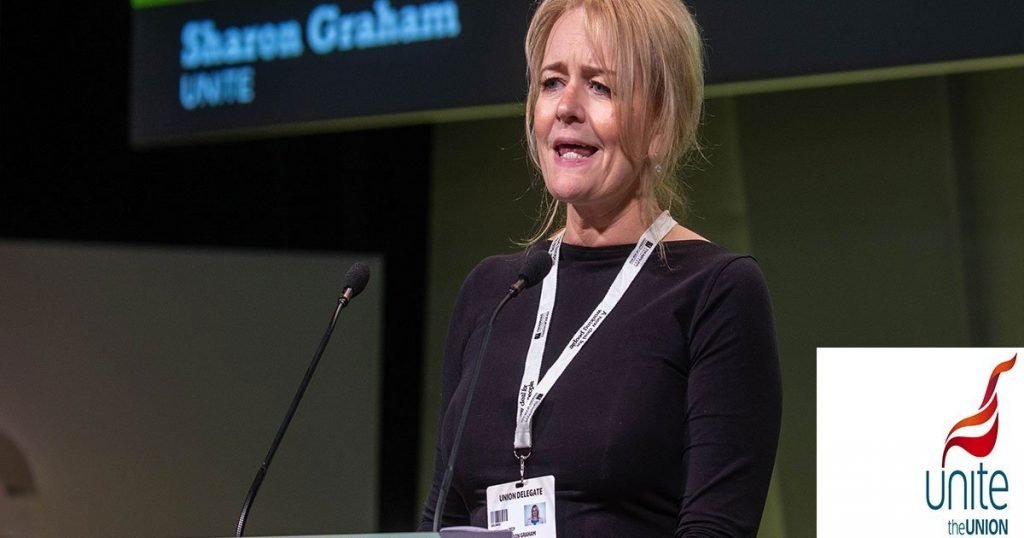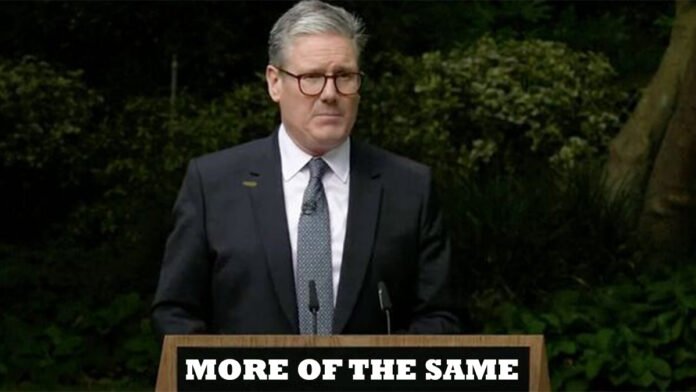If Tory Policies Broke Britain, How Will Labour’s Tory Policies Ever Possibly Fix It?
Prime Minister Starmer, our supposed saviour from Conservative misrule, now warns of “painful” budgets ahead. It’s a classic bait-and-switch manoeuvre: voters took the bait of change, and now face the switch to more of the same. The question looms large: If Tory policies broke Britain, how can Labour’s Tory-lite approach possibly mend it?
Starmer’s reference to a “£22bn black hole” in national finances smacks of the same fear-mongering tactics employed by his predecessors. It’s a convenient narrative to justify austerity measures and tax hikes, conveniently ignoring that £9 billion of this figure stems from Labour’s own recent public sector pay rises.
The scary story of national bankruptcy is a myth for a sovereign nation that controls its own currency, yet it’s a powerful tool for manipulating public opinion.
The Prime Minister bleats about “inheritance” and “deep rot,” as if he’s stumbled upon some shocking revelation rather than the very mess he campaigned to fix.
Starmer’s betting that the public will continue to blame the former Tory government for any tax rises is a cynical political calculation. It’s a weak excuse that doesn’t hold water when compared to the bold vision and achievements of past Labour governments who have won elections to change things and not maintain the status quo.
You have to wonder where we would be if Clement Attlee’s post-war administration, facing far more dire circumstances, would have thrown up his hands and cried poverty. Instead, Attlee’s Labour government managed to implement sweeping reforms, create a welfare system, birth the NHS, build over a million council homes and achieve near-on full employment.

In comparison, Starmer would have us believe there is an existential force, a national emergency this mythical black hole threatening our way of life. In the end, it’s a literary of excuses for a manifesto that’s stillborn thrown away before it’s even begun.
Let’s be clear: this isn’t real money we’re talking about. It’s the fiscal equivalent of a mirage – always shimmering on the horizon, always just out of reach. It’s a promissory note written on water, a cheque dated for the 12th of Never.
Labour’s approach exposes the eroding ideological divide between the two major parties. The decision to maintain policies like the two-child benefit cap while pledging funds for international conflicts raises questions about the party’s priorities.
For us mear mortals we’re told to brace for tax hikes, but fear not – the sacred cow of corporation tax shall remain unmolested. Heaven forbid we ask the wealthy to shoulder their fair share. No, it’s the pensioners who’ll feel the chill this winter, as their fuel allowance is snatched away. So much for protecting the vulnerable.
Forget the fact, that Starmer pledged to slash energy bills by £400, yet now presides over further increases. He promised change but delivers warmed-over Tory policies. As George Orwell astutely observed, “Political language… is designed to make lies sound truthful and murder respectable, and to give an appearance of solidity to pure wind.” let’s face it we are getting the wind…
The truth is the zeitgeist of our age, it seems, is one of managed decline, of lowered expectations, of a populace trained to expect less and less from those who govern them. It’s a grim picture, painted in the drab colours of austerity.
If you want answers you have to look elsewhere.

Sharon Graham, general secretary of Unite, rightly criticizes Starmer’s “bleak vision of Britain” and calls for a wealth tax on the super-rich and a tax on excess profits. These proposals, coming from outside the Labour Party, highlight the ideological drift of the current leadership from its traditional base and values.
Unite chief says ‘bleak vision of Britain is not what we need now’ after Starmer’s speech
Sharon Graham, the general secretary of the Unite union, has criticised the “bleak vision” Keir Starmer delivered in his first major speech as prime minister, saying it’s “time to see the change that Labour promised”.
Graham, an outspoken critic of some of Labour policies, said:
We don’t need more excuses about fiscal responsibility or talk of wealth creation. We should not pit pensioners against workers, that is not a choice that should be on the table.
We now need Labour to have the courage to make the right choices. To be Labour and fight for change for workers and our communities.
She acknowledged that Britain “is in crisis” but said there is money to rebuild industry, infrastructure and public services if it is found in the right places. “If we taxed 1% on the wealthiest 1%, the so-called black hole would be gone,” she wrote in a tweet thread on X.
Starmer emphasised trying to stimulate growth in the economy (instead of just relying on tax rises or spending cuts), but Graham said Britain “can’t wait for growth” and the country’s industries “can’t wait for investment”.
Unite is calling on Labour to bring in an emergency 1% wealth tax on the assets of the super-rich to pay for 10% pay rises for public sector workers and fill more than 100,000 NHS vacancies.
The demand from Unite, Britain’s second biggest trade union, is in one of several motions to the Trades Union Congress, which meets in Brighton next month, that will expose tensions between the government and parts of the union movement.
For the rest of us, we witness a government seemingly more preoccupied with balance sheets than the welfare of its citizens. The cancellation and review of various infrastructure projects, coupled with the scrapping of planned social care changes, paint a grim picture. It’s a canvas of missed opportunities and neglected responsibilities, where the brushstrokes of austerity overshadow the vibrant hues of progress and social justice. This is not a government addressing the fundamental issues facing the country; it’s one retreating from them, leaving the most vulnerable to bear the brunt of its fiscal timidity.
The vision we’re offered today is a relentless cascade of crises, each bleeding into the next with no respite in sight. It’s as if we’re trapped in an Orwellian nightmare, where the boot of economic uncertainty and social instability stomps continuously on our collective faces. This isn’t governance; it’s a war of attrition against the hopes and aspirations of ordinary people. The promise of a better tomorrow seems to recede with each passing day, replaced by a grim acceptance of perpetual struggle. It’s a future where resilience isn’t a virtue but a necessity, and where the light at the end of the tunnel feels more like an oncoming train than a beacon of hope.
Naomi Klein’s observation about disaster capitalism seems particularly apt: “The recent spate of disasters has translated into such spectacular profits that many people around the world have come to the same conclusion: the rich and powerful must be deliberately causing the catastrophes so that they can exploit them.” This perspective raises uncomfortable questions about the true motivations behind government policies.
The truth is, Britain isn’t broken by some mysterious force. It’s broken by decades of neoliberal policies serving the few at the expense of the many. Starmer’s “Red Tory” approach offers no real alternative, just a repackaging of the same failed ideas.
If Labour truly wants to fix what’s broken, it must rediscover its roots. Tax the wealthy, invest in public services, and prioritise the needs of working people over corporate profits. Anything less is just rearranging the deck chairs on a sinking ship.
But let’s not hold our breath. As things stand, it seems the only change we can expect is the name on the door of Number 10. The policies – and the pain – will remain depressingly familiar.
Support Independent Journalism Today
Our unwavering dedication is to provide you with unbiased news, diverse perspectives, and insightful opinions. We're on a mission to ensure that those in positions of power are held accountable for their actions, but we can't do it alone. Labour Heartlands is primarily funded by me, Paul Knaggs, and by the generous contributions of readers like you. Your donations keep us going and help us uphold the principles of independent journalism. Join us in our quest for truth, transparency, and accountability – donate today and be a part of our mission!
Like everyone else, we're facing challenges, and we need your help to stay online and continue providing crucial journalism. Every contribution, no matter how small, goes a long way in helping us thrive. By becoming one of our donors, you become a vital part of our mission to uncover the truth and uphold the values of democracy.
While we maintain our independence from political affiliations, we stand united against corruption, injustice, and the erosion of free speech, truth, and democracy. We believe in the power of accurate information in a democracy, and we consider facts non-negotiable.
Your support, no matter the amount, can make a significant impact. Together, we can make a difference and continue our journey toward a more informed and just society.
Thank you for supporting Labour Heartlands









